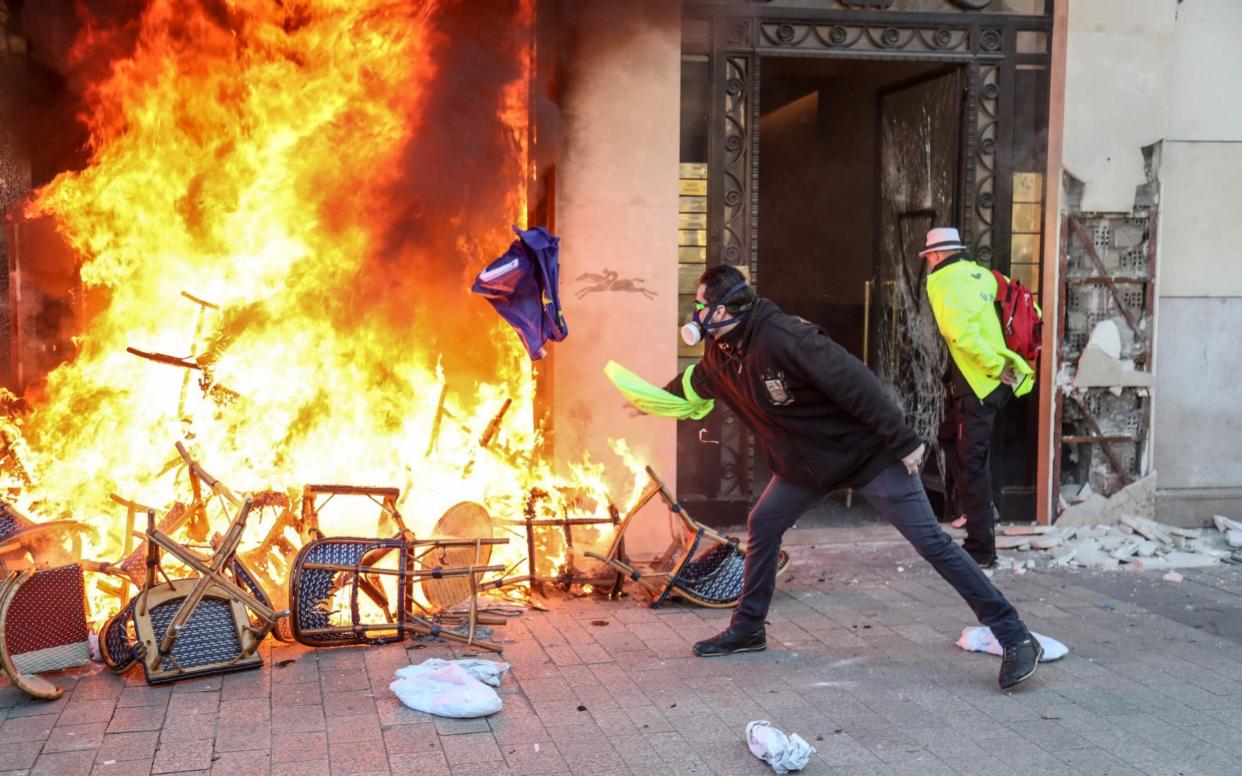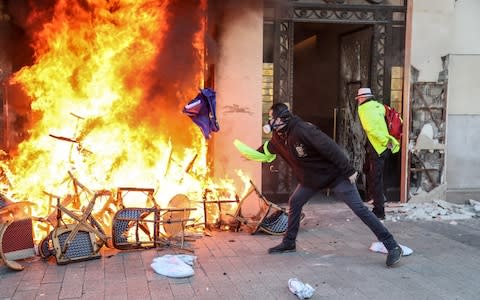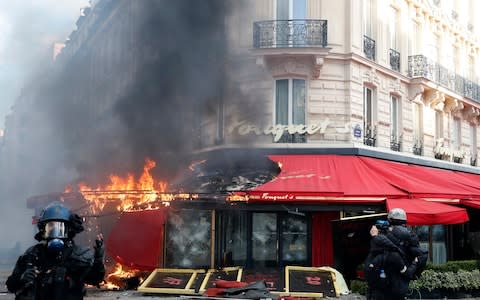Paris police chief fired over Champs-Elysées riots as French government to ban protests in trouble spots

The Paris police chief has been fired for failing to contain violent riots that saw a string of flagship restaurants and shops torched along the French capital’s famed Champs-Elysées.
The government announcement came after top security officials acknowledged that attempts by 5,000 police to stop several hundred black-clad rioters running amok along “the world’s most beautiful avenue” for seven hours on Saturday had been an abject “failure”.
Nominally part of the ”yellow vest" movement, masked rioters burned down the famous Fouquet's restaurant as well as several newspaper stands, a string of luxury shops and vehicles.
The shocking weekend scenes, in which a mother and child narrowly escaped death in a burning building, pose a fresh security headache to Emmanuel Macron, the French president, after four months of “gilet jaunes” protests and amid opposition claims he is a soft touch on hooligans.
Caught napping, Mr Macron had rushed back from a ski break to pledge "strong measures” amid calls on social media for fresh violence next Saturday. The Right-wing opposition accused the president of being a soft touch, while police unions said they had not been given sufficiently robust orders to engage with rioters.

After crisis security talks on Monday, Edouard Philippe, the French prime minister, said: “The strategy for maintaining order was not correctly executed.” As a result, he said Paris police chief Michel Delpuech would be replaced by the current state prefect of the Nouvelle Aquitaine region, Didier Lallement.
Mr Philippe pledged to ban “yellow vest” demonstrations in the worst-hit areas - including the Champs-Elysées but also squares in the cities of Bordeaux and Toulouse - if police deem they have been infiltrated by ultra-violent trouble makers. In these three areas, police will have “greater autonomy” to disband any groups with the use of“drones” and “marker products” to identity individuals.
Fines for those who participate in illegal gatherings will be “significantly increased”. Mr Philippe also promised to beef up Paris’ police’s security doctrine to engage in more “contact” with rioters at the behest of police unions, despite the risk of greater injury.
"You have to take responsibility and engage, with the possibility that people will get hurt," said Frederic Lagache of the Alliance police union.
France has for decades preferred to tackle mass protests with tear gas and rubber bullets but avoid physical clashes against large groups.

In another potentially controversial move, Mr Philippe effectively backed greater use of “defensive ball launchers”, or LBD, which a top French rights ombudsman and the UN have criticised as too dangerous. Dozens of protesters have been injured by these, including some who claim to have lost an eye after being hit by such rubber projectiles.
One police union said LBDs had been replaced with “marshmallows” to placate such groups, leaving officers exposed against protesters hurling paving stones and other weapons. Mr Philippe said he regretted that “inappropriate orders had been given (on Saturday) to reduce their use”.
The new surge in violence came as the four-month-old yellow vest movement demanding economic justice was dying down and a nationwide “great debate” on those demands came to a close. Mr Macron’s participation in a string of discussions had seen his popularity rise after plummeting early on in the protests but commentators said the latest violence risks seeing those gains falter.

Last month the French parliament passed an "anti-troublemakers" bill, which will only take effect once the Constitutional Council rubber stamps it.
If enacted, it will grant regional prefects powers to prevent people seen as a serious threat to public order from protesting, and would force protesters involved in violence to pay for damage. It would also make it a crime for protesters to conceal their faces, punishable by up to one year in prison and a €15,000 (£13,000) fine.
The bill has been criticised by rights groups, opposition members and even members of Mr Macron's centrist party as going too far in restricting freedoms. The Right-wing opposition says it doesn’t go far enough.
The Paris region's Chamber of Commerce said 91 businesses suffered damage in the Champs-Elysées riots. It called for an "emergency plan" to support the those shopkeepers and employees. The French insurance federation put the figure for claims linked to yellow vest violence over the past four months at €170 million, not counting last Saturday's damage.

